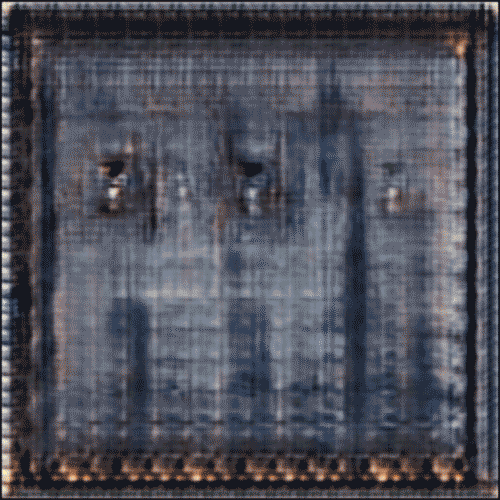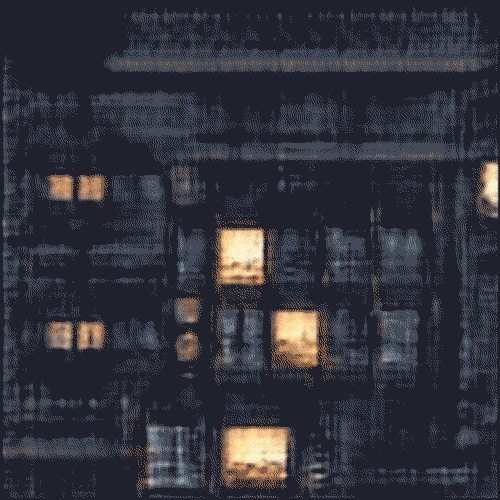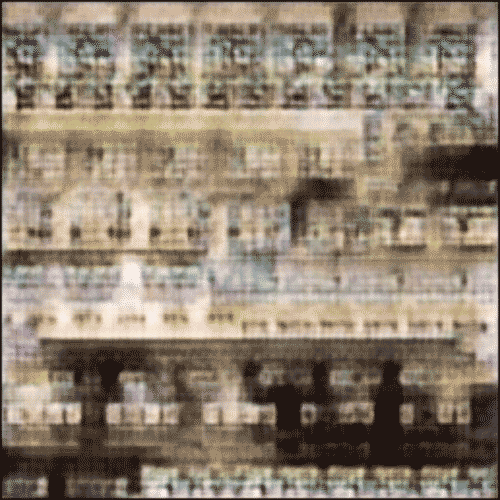Robin Hood Gardens: Rewound
James Quinn, Eddie Wong and Nathan Bayliss
This work examines how a story can be told using the medium of a generative adversarial network (GAN). We configure the GAN algorithm to create a memory haunted by a recently departed past and the hope for future that never arrived, or what the late Mark Fisher termed ‘lost futures’. Adopting Jacques Derrida hauntological approach, we cast the generative adversarial neural network (GANs) technology in the role of a ‘ghost’ that explores Robin Hood Gardens estate, one of the many iconic, brutalist utopian social housing projects in London.
As a group, we share common interests in that we seek to explore stories found within the urban landscape. We are intrigued by the aesthetics generated by a form of neural network implementation called Conditional Generative Adversarial Network(CgAN or GAN). This is the same algorithm used by prominent artists such as Robbie Barrat, Memo Akten and Mario Klingemann.
With hauntology as our guiding theoretical framework, we honed in on Robin Hood estate as a rich source of material for our exploration. We draw upon the book ‘Regeneration! Conversations, Drawings, Archives & Photographs from Robin Hood Gardens’ by Jessie Brennan for a distilled history of the place according to the old inhabitants of the estate. We recorded audio snippets from conversation transcripts in the book to give us the voice for our artefact.
We first frame our research by employing the language of ‘spectrality’ as espoused by Jacques Derrida. According to Derrida, how we experience our every present moment is always mixed up with the past and the future, that which is present is never fully there, as it is mixed up with absence. In this sense, our experiences in the present are always ‘haunted’ by that which no longer exists (the past) and haunted by that which has yet to exist (the future), coloring our experience as ghostly. This form of absence then is represented by Derrida with "the figure of the ghost as that which is neither present, nor absent, neither dead nor alive”.
It is this ghost within the generative adversarial network that hints at a useful deconstructive tool to dislodge the static narrative of our world - and our understanding of the present. Mark Fisher’s application of hauntology in his critical analysis of mass culture touches on the static present that is haunted by past media and entertainment. Using Mark Fisher’s view on electronic music as an example of “the confrontation with the cultural impasses; the failure of the future”, we answer Mark’s call to action and in the same hauntological spirit, engage with GAN technology to critically re-open old wounds.
Tartleton Gillespie in his essay ‘Algorithm’ outlines the different perspectives in which to explore GAN. On a technical level, GAN is a duality of neural networks that compete to describe a notional “real” result. Mathematically these networks are almost identical, but when the networks are placed in an adversarial competition, they dramatically increase the speed and quality of generating a “new”ness. Further research and working with GAN and its constraints, we become aware of the need to carefully curate the type of data we share with it. We build two datasets based on archival photography of Robin Hood Gardens, including day and night photography. From this we built two statistical models of the site with which we then use to generate speculative reconfigurations of the site.
References:
Mark Fisher “The Slow Cancellation of the Future” lecture (https://youtu.be/aCgkLICTskQ)
Derrida, Jacques, Spectres of Marx: The State of the Debt, the Work of Mourning & the New International, translated by Peggy Kamuf, London: Routledge, 1994
Colin Davis; Hauntology, spectres and phantoms, French Studies, Volume 59, Issue 3, 1 July 2005, Pages 373–379
Fisher, Mark. Ghosts of My Life: Writings on Depression, Hauntology and Lost Futures. Zero Books, 2014.
Tarleton Gillipsie Algorithm [draft] [#digitalkeywords], June 2014
Christoper Hesse, https://github.com/phillipi/pix2pix
Brennan, Jessie. Regeneration!: Conversations, Drawings, Archives & Photographs from Robin Hood Gardens. Silent Grid, 2015.
Generative Adversarial Networks, https://arxiv.org/abs/1406.2661, Ian J. Goodfellow, Jean Pouget-Abadie, Mehdi Mirza, Bing Xu, David Warde-Farley, Sherjil Ozair, Aaron Courville, Yoshua Bengio

































































